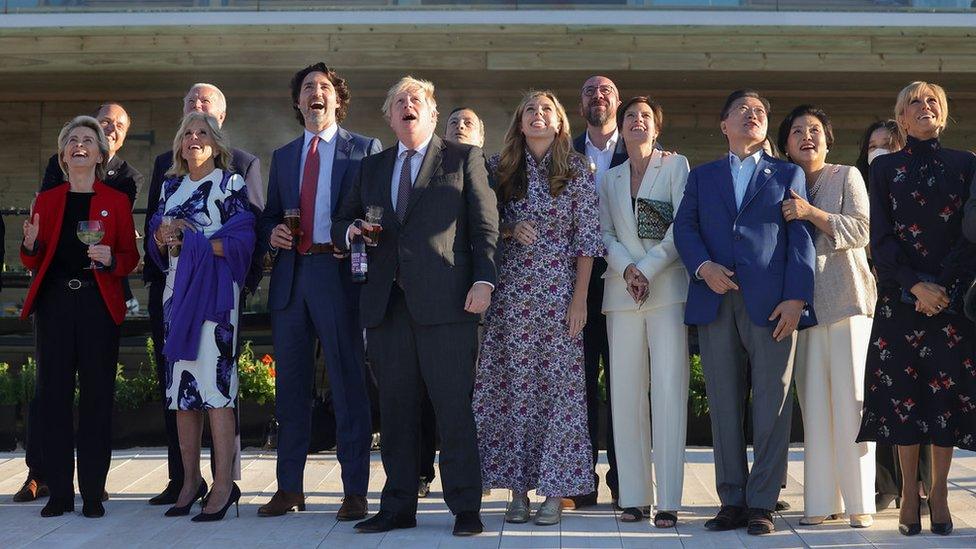G7: Vaccines, climate change and girlsÔÇÖ education lead promises from world leaders
- Published
- comments

A display by the RAF's Red Arrows captivated the G7 leaders
After several days of meetings, wonderful Cornish weather and slightly-awkward Covid-safe elbow bumps, some of the world's most influential political leaders have made a number of promises about what they are going to work together on.
Top of the list was a plan to share vaccines with other nations, which British Prime Minster Boris Johnson says is a "big step towards vaccinating the world."
Climate change was also high on the leaders' to-do list, with an agreement made to get rid of coal-fired power stations that don't use carbon capture technology. There was also a promise to help poorer countries cut emissions and a plan to support a 'green revolution'.
There was also an agreement to help young girls around the world. Leaders agreed that within the next five years they would help 40 million girls get into education.
G7: What happened at the G7 summit?
Who made these promises?
World leaders headed to Carbis Bay in Cornwall for the first G7 meeting since 2019. Last year's get-together had to be cancelled due to the pandemic.
The UK was the host, with the United States, Germany, France, Canada, Italy and Japan also in attendance.
The discussions among the leaders were held against the stunning backdrop of the Cornish coast.
There were also leaders from Australia, India, South Korea and the EU there to be involved in the talks.
The final stage of the meeting is to publish a communique that sets out what was agreed. This year the document was 25 pages long!
Vaccine help
The politicians pledged to supply around a billion vaccines to poor countries directly, or to give them to the World Health Organization (WHO) to distribute.
The WHO has a scheme called Covax, which is designed to help share vaccines around the world and help ensure everyone gets the help they need to end the pandemic.
Boris Johnson said he hoped the agreement could "channel all our diplomatic, economic and scientific might to defeating Covid for good".
There was some criticism though that the leaders haven't done enough, with some campaigners saying 11 billion vaccines need to be donated.
Climate promises
Boris Johnson hosted a press conference at the end of the summit
Sir David Attenborough addressed the leaders and had a clear message for them.
He told those gathered in Cornwall: "The decisions we make this decade - in particular the decisions made by the most economically advanced nations - are the most important in human history."
Boris Johnson and David Attenborough at a previous meeting
The leaders listening are the leaders of the 'most economically advanced nations' Sir David was speaking about, so his message was clear: you need to do something.
There were agreements. Leaders agreed to phase-out cars that run on fossil fuels, and also talked about ending the use of coal-power energy plants. But some experts are complaining there were no dates agreed for these things to actually happen.
Laurence Tubiana, a French climate expert summed up the agreements as, "a plan to make a plan."
More education for girls
A school project in Malawi - educating girls can improve health and prosperity in the wider community
The final communique said the leaders wanted to 'promote equality' around the world, and one of the ways of doing this was to promote gender equality by getting more girls into education.
The leaders promised $2.75 billion (around £2bn) for the Global Partnership for Education, an international charity focused on increasing the number of children in school.
Boris Johnson had already announced the UK's plan to donate £430 million to the fund and, and described it as, "a source of international shame" that children were missing out on education "purely because they are female, their parents' income or the place they were born."
But Mr Johnson has also come under criticism this month - including from his own MPs - for cutting the amount of money that the UK gives in foreign aid.
